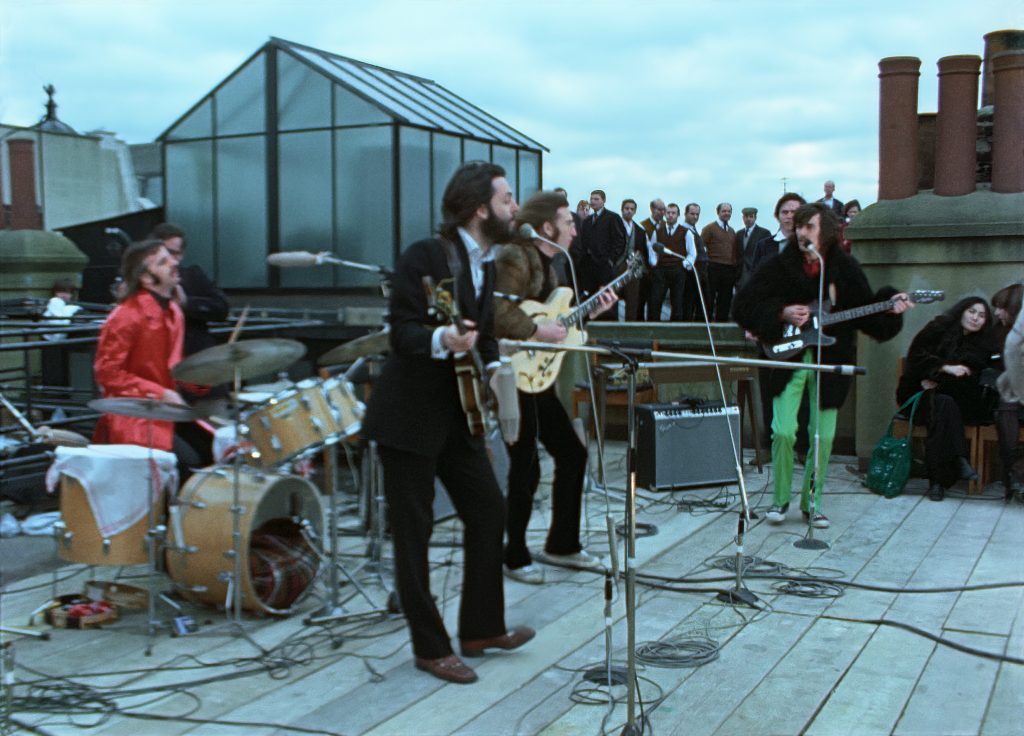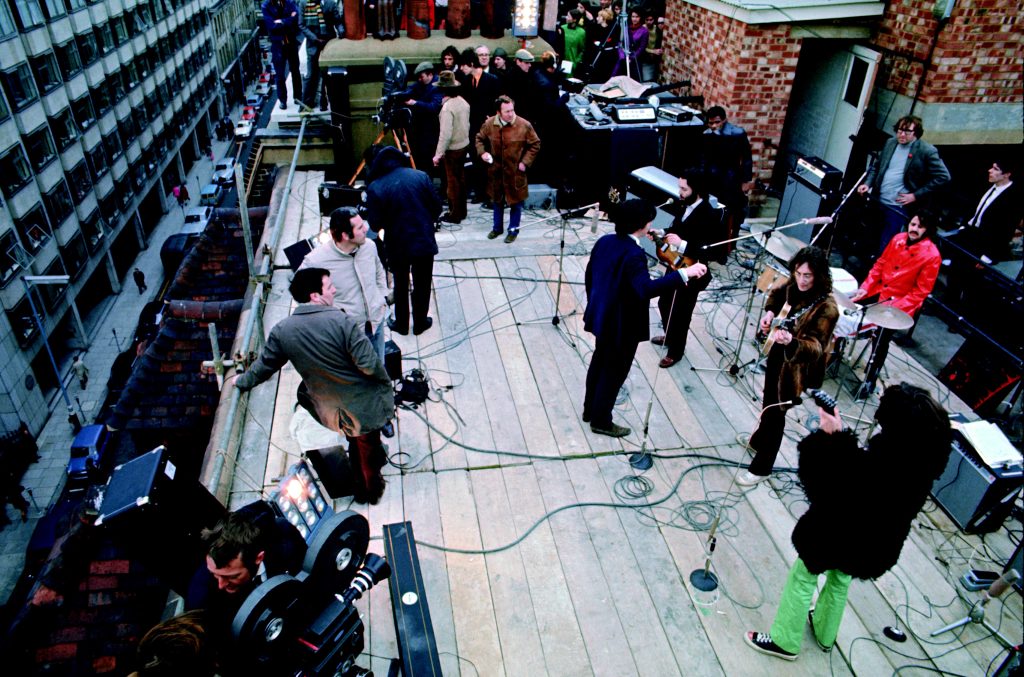January 30, 2022
by Carla Hay

“The Beatles: Get Back–The Rooftop Concert”
Directed by Peter Jackson
Culture Representation: Taking place in London on January 30, 1969, the concert film “The Beatles: Get Back–The Rooftop Concert” features a predominantly white and mostly British group of people (with one Japanese person and one African American person) representing the middle-class and wealthy in this chronicle of the Beatles’ last live public performance.
Culture Clash: Before the band broke up in 1970, the Beatles had internal struggles and disagreements, including if and where they would do this live concert.
Culture Audience: Besides appealing to the obvious target audience of Beatles fans, “The Beatles: Get Back—The Rooftop Concert” will appeal primarily to people who are fans of 1960s rock music who want detailed observations of what music studio sessions looked like at the time.

If you’ve seen the Disney+ 2021 docuseries “The Beatles: Get Back,” then there are no surprises in the concert documentary “The Beatles: Get Back—The Rooftop Concert,” which consists of the entire rooftop concert that was in the docuseries. The concert, which was the last public performance by the Beatles, took place on the roof of Apple Corps headquarters in London, on January 30, 1969. Footage for the concert was originally directed by Michael Lindsay-Hogg for the 1970 Beatles documentary “Let It Be,” and then restored for “The Beatles: Get Back” docuseries by director Peter Jackson.
To celebrate the 53rd anniversary of this concert, Walt Disney Pictures released “The Beatles: Get Back—The Rooftop Concert” in IMAX theaters in select cities worldwide, as a one-day-only global premiere on January 30, 2022. The event included a live Q&A with director Jackson, who was interviewed from New Zealand. He answered questions from a moderator and pre-selected inquiries from the public. (Most of the selected questions can from fans in the U.S.) Ironically, Jackson said during the Q&A that he couldn’t watch the movie in IMAX with the rest of the global audience because there were no IMAX theaters near him in New Zealand. The Q&A was about 30 minutes, while “The Beatles: Get Back—The Rooftop Concert” had a total running time of about 64 minutes.
A complete review of “The Beatles: Get Back” can be found here, including a summary of the concert. For the rooftop concert, the documentary shows the band performing “Get Back” (twice, but not consecutively), “Don’t Let Me Down” (twice, but not consecutively), “One After 909,” “Dig a Pony” and “I’ve Got a Feeling.” The members of the Beatles—singer/bass player Paul McCartney, singer/rhythm guitarist John Lennon, singer/lead guitarist George Harrison and drummer Ringo Starr—are all in fine form. The documentary makes good use of split screens to occasionally show different camera angles of the same scene.
The IMAX screening of “The Beatles: Get Back—The Rooftop Concert” included a new sound mix specifically for IMAX screens, making it well worth it to see the movie in the IMAX format—whether it was to hear the creaking of the rooftop floorboards or the breathing of the band members in between songs. Jackson said in the Q&A that the IMAX sound mixes were supervised by Gilles Martin (son of the Beatles producer George Martin) at Twickenham Studios in London, where the Beatles recorded much of what’s seen in “Let It Be” and “The Beatles: Get Back.” Jackson added that Twickenham is the only studio in the United Kingdom that could do IMAX sound mixing, so it was like full-circle destiny for this documentary. “Twickenham gets the last word,” Jackson quipped.
The concert film has the same introductory summary of the Beatles’ career up until 1969 that was the intro for “The Beatles: Get Back” docuseries. The docuseries included song titles in the captions, whereas “The Beatles: Get Back—The Rooftop Concert” does not have song titles as captions with the concert footage. What also isn’t in “The Beatles: Get Back—The Rooftop Concert” is the behind-the-scenes band squabbling (seen in the docuseries) over whether or not this rooftop concert was going to take place. Harrison initially didn’t want to do the concert on the roof, but he was outvoted by the other Beatles.
During this unannounced, surprise concert, which took place toward the end of a work day on London’s Savile Row, it’s clear that Harrison and the rest of the band were enjoying themselves. Any reluctance that Harrison previously had about doing the show was no longer apparent. The concert was also known for almost being interrupted by police officers, who arrived in response to noise complaints. Ray Dagg, the officer who led the investigation, repeatedly threatened that people would be arrested if the Beatles didn’t shut down the concert. The Beatles knew when to stop the show themselves instead of the police forcing them to shut it down.
“The Beatles: Get Back—The Rooftop Concert” has the same ending as “The Beatles: Get Back”—footage of the Beatles listening to the playback recordings of the concert. And then, the end credits show a compilation of footage taken of the Beatles in the studio recording some of the songs that would end up on the “Let It Be” album, such as the title track and “Two of Us.” An amusing highlight during this end-credits compilation is when Lennon silently and comedically mimics McCartney singing “Let It Be.”
For many Beatles fans, one of the main reasons to go to this IMAX event was to see the Q&A with Jackson, who is a self-described Beatles superfan. He said that there are about three or four hours’ worth of unreleased footage, including interviews that he and his team did with many of the people (including McCartney and Starr) who were involved in the rooftop concert and companion recording sessions. Jackson said he was unsure if these interviews would ever be released, but he knew that he didn’t want these “talking head” interviews in “The Beatles: Get Back” because the interviews would be too distracting to the immersive experience of viewers feeling transported back to January 1969.
However, he noted that if Lindsay-Hogg’s “Let It Be” documentary is ever released on Blu-ray or DVD, Jackson thinks these interviews would make ideal extras for this home video release. (The “Let It Be” documentary was taken out of distribution years ago, but bootleg copies exist.) Jackson said that he also hopes that the documentary’s recording studio footage showing complete performances of songs (not just snippets) will eventually be released too.
As a sneak peek of the “talking head” interviews, Jackson took out his iPad to show an approximately 15-second clip of an interview with Dagg, the constable who was the most agitated and uptight cop when the police showed up at Apple Corps in response to the noise complaints. Dagg, who was 18 years old in January 1969, was the cop making the threats to have people arrested because of the concert.
Jackson said that Dagg has become “a little bit of a cult figure” for some Beatles fans, because Dagg’s irritated reactions to the concert are hilarious in hindsight. In the interview clip that Jackson showed, a now-elderly Dagg is interviewed on the same rooftop where the concert took place. Dagg comments on his threats to arrest people and shut down the concert: “In those days, it was just to get the job done. And they had to stop, as far as I was concerned.”
Jackson urged Beatles fans to put “public pressure” on Disney and Apple to let these interviews and other unreleased footage be seen for posterity. He says of the footage: “I’m sure that Apple, sitting on this gold mine, can figure out some way that it can be used.” Jackson concluded the Q&A by saying of “The Beatles: Get Back” documentary: “I’m hoping at some point that I’ll get to do an extended cut. I’d love to put full-length performances of the songs in, and some songs we didn’t include at all. There are also some conversations that are historically interesting. They should probably be seen at some point.”
Walt Disney Pictures released “The Beatles: Get Back—The Rooftop Concert” as an exclusive IMAX event screening with a filmmaker Q&A on January 30, 2022. “The Beatles: Get Back—The Rooftop Concert” will have a global theatrical engagement on February 9, February 11, February 12 and February 13, 2022. The complete docuseries “The Beatles: Get Back” is available on Disney+ and will be released on Blu-ray and DVD on February 8, 2022.
